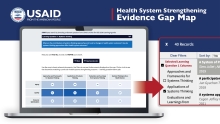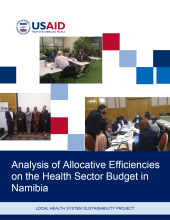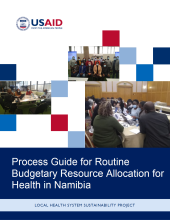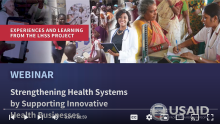Learning and knowledge sharing are fundamental to the LHSS Project. We invite you to search LHSS knowledge products and resources for the latest approaches, insights, and learning in the field of integrated health systems strengthening.

The Evidence Gap Map identifies existing literature examining the impact of health systems strengthening on health outcomes. Evidence is organized around USAID's Health System Strengthening Learning Agenda.
This video captures Timor-Leste’s progress in increasing COVID-19 vaccination coverage and strengthening the capacity of health care professionals – efforts supported by LHSS’s local NGO partner HAMNASA.
This two-pager focuses on USAID’s Learning Question 3, “What measurement tools, approaches, and data sources, from HSS or other fields, are most helpful in understanding interrelationships and interactions, and estimating impact of HSS interventions on health system outcomes and priority health outcomes?”
This two-pager focuses on USAID’s Learning Question 2, “What conditions or factors successfully facilitate the institutionalization and/or implementation at scale of good practices that improve health system outcomes, and why? What are lessons learned regarding planning for sustainability and achieving results at scale?”

Infographic describes seven lessons learned in Colombia while prioritizing health system strengthening during the COVID-19 pandemic.
This video shares the testimonials and progress made on the collaborative work achieved between territorial entities and community-based organizations as a result of the capacity-building process carried out by the Healthy Communities program to promote the inclusion of the migrant population in Colombia's general social security system in health.
In this video, learn how Colombia is strengthening HSS through: strengthening governance, promoting sustainable financing, accessing the provision of health services, and emergency response.

This analysis identified several inefficiencies related to how the financial budget and other financial resources are allocated and spent. It also presented potential actions that can improve resource allocation within the MoHSS budget and address some of the challenges identified during the analysis.

This process guide outlines an iterative process to support budgetary allocation decisions aligned with regional populations and needs as prioritized in the EHSP. The process guide proposes a broad decision-making framework that can be used to review current practices and move toward more efficient approaches in resource allocation.
This document describes the process to be followed for the regular revisions of the EHSP and presents important elements that support the updating, so that an EHSP that is a sustainable, equitable, and accessible—within financial and other constraints—is delivered to the population.
This PSCSE landscape report was compiled using evidence generated from a comprehensive documentary review and selected key informant interviews conducted to gain insight into the status of implementation of existing PPPs, and the challenges, lessons learned, and success stories.
The Namibian government has a long history of working with the private sector to deliver essential health services. However, the engagement between the Ministry of Health and Social Services (MOHSS) and private sector actors within the health sector is mostly through ad hoc interactions during national campaigns, planning processes and service delivery. Thus, there is a need for more-coordinated and more-strategic engagement to effectively leverage the private sector's capacity and strategically position the private sector’s role in advancing universal health coverage (UHC).
Uniéndose, las organizaciones locales y regionales están trazando un camino adelante para mejorar el acceso a la atención médica para las mujeres y otros migrantes vulnerables en Honduras.
Le Projet de viabilité des systèmes de santé locaux (LHSS) aide les pays à mettre en place des systèmes de santé durables et autofinancés qui offrent des soins de santé de qualité pour tous. Cette fiche d’information résume notre approche et nos domaines techniques d’expertise.

